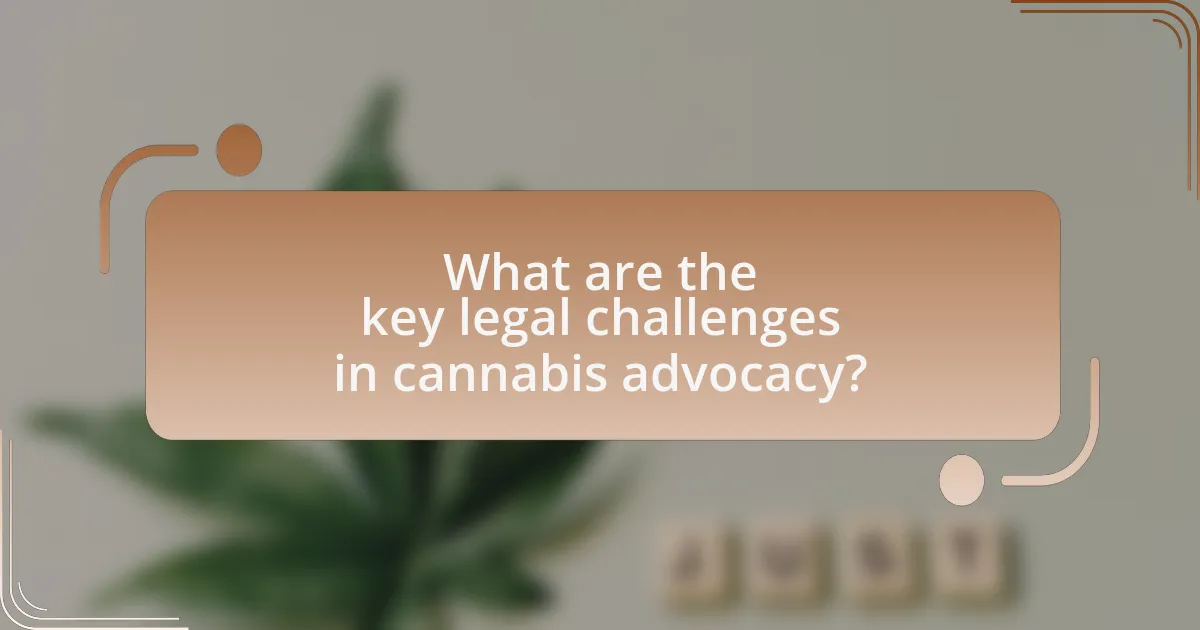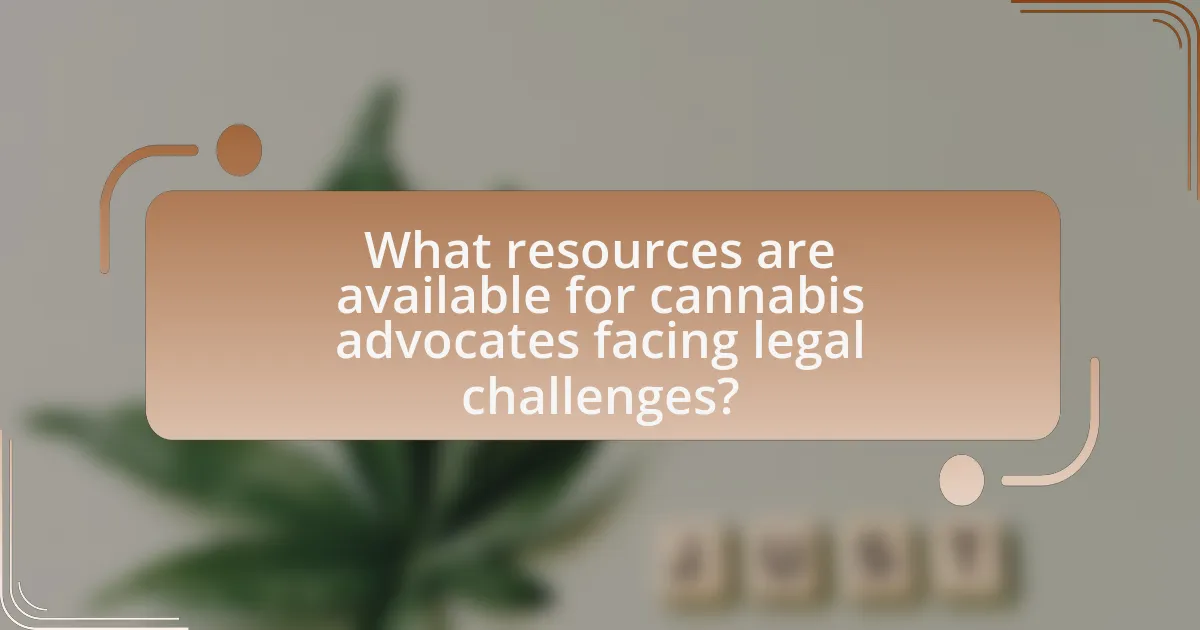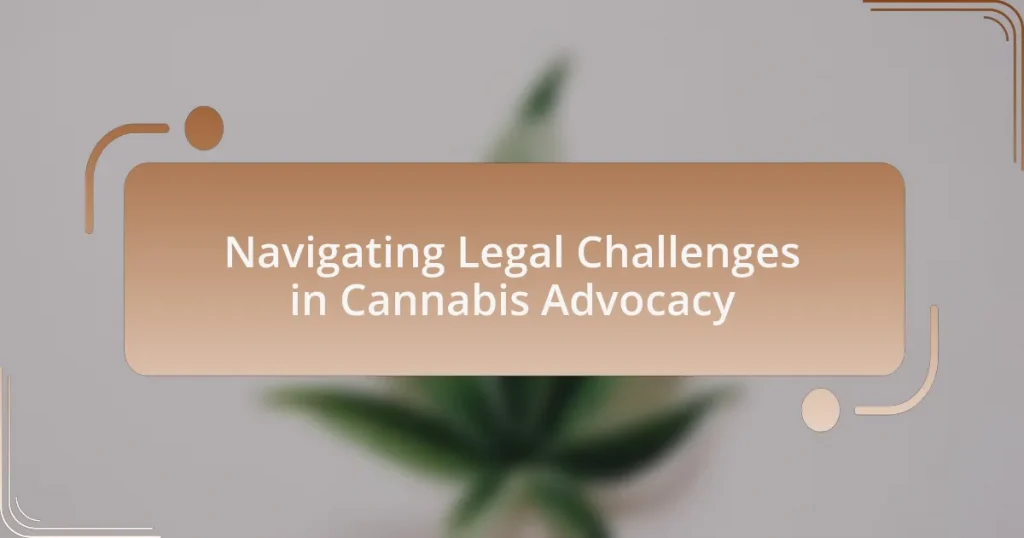The article focuses on the legal challenges faced in cannabis advocacy, highlighting key issues such as federal prohibition, state-level regulatory inconsistencies, and banking restrictions. It examines how federal laws, including the Controlled Substances Act, impede advocacy efforts and complicate compliance for businesses. The article also discusses the impact of varying state laws on advocacy strategies, the role of state courts in legal disputes, and the implications of international laws on national cannabis policies. Additionally, it outlines strategies for advocates to navigate these challenges, including grassroots mobilization, lobbying, and the importance of legal education and resources.

What are the key legal challenges in cannabis advocacy?
The key legal challenges in cannabis advocacy include federal prohibition, state-level regulatory inconsistencies, and banking restrictions. Federal prohibition under the Controlled Substances Act classifies cannabis as a Schedule I drug, creating significant barriers for advocacy efforts and limiting research opportunities. Additionally, the lack of uniformity among state laws leads to confusion and complicates compliance for businesses and advocates. Banking restrictions further hinder the cannabis industry, as many financial institutions are reluctant to serve cannabis-related businesses due to federal regulations, limiting access to essential financial services. These challenges collectively impede the progress of cannabis advocacy and reform efforts.
How do federal laws impact cannabis advocacy efforts?
Federal laws significantly hinder cannabis advocacy efforts by maintaining cannabis as a Schedule I substance under the Controlled Substances Act, which classifies it as having no accepted medical use and a high potential for abuse. This classification creates legal barriers for advocacy groups, limiting their ability to promote legalization or reform at both state and federal levels. For example, federal prohibition restricts research on cannabis, impeding the ability to provide scientific evidence that could support advocacy claims for its medical benefits. Additionally, federal laws can lead to criminal penalties for individuals and organizations involved in cannabis advocacy, discouraging participation and funding. The ongoing conflict between state legalization efforts and federal prohibition complicates advocacy strategies, as seen in states where cannabis is legal but still faces federal enforcement actions.
What specific federal regulations affect cannabis use and distribution?
The specific federal regulations that affect cannabis use and distribution include the Controlled Substances Act (CSA), which classifies cannabis as a Schedule I substance, making its use and distribution illegal under federal law. This classification prohibits the cultivation, sale, and possession of cannabis, regardless of state laws that may permit its use for medical or recreational purposes. Additionally, the Federal Food, Drug, and Cosmetic Act (FDCA) regulates cannabis products intended for consumption, requiring them to meet safety and labeling standards. The Drug Enforcement Administration (DEA) enforces these regulations, impacting how cannabis businesses operate and limiting their access to banking and financial services.
How do federal enforcement policies shape advocacy strategies?
Federal enforcement policies significantly shape advocacy strategies by determining the legal landscape within which advocates operate. These policies, such as the Cole Memorandum and the Controlled Substances Act, influence how advocates prioritize their efforts, allocate resources, and engage with lawmakers. For instance, when federal enforcement is relaxed, advocates may focus on expanding access and promoting legalization, while stricter enforcement may lead them to concentrate on legal defenses and harm reduction strategies. The impact of these policies is evident in the shifting tactics of advocacy groups, which adapt their messaging and campaigns based on the perceived risks and opportunities presented by federal regulations.
What state-level legal challenges do advocates face?
Advocates face numerous state-level legal challenges, primarily including restrictive regulations, inconsistent state laws, and potential criminalization of cannabis-related activities. These challenges arise because each state has its own legal framework governing cannabis, leading to discrepancies in what is permissible. For instance, while some states have legalized cannabis for medical or recreational use, others maintain strict prohibitions, creating a patchwork of legality that complicates advocacy efforts. Additionally, advocates often confront hurdles such as limited access to banking services due to federal regulations, which can hinder the financial viability of cannabis businesses. These legal obstacles can impede the progress of advocacy initiatives and the implementation of cannabis reform.
How do varying state laws create a complex landscape for cannabis advocacy?
Varying state laws create a complex landscape for cannabis advocacy by establishing differing legal frameworks that affect access, regulation, and enforcement. For instance, some states have legalized recreational cannabis, while others maintain strict prohibitions, leading to inconsistencies in legal protections for users and advocates. According to the National Conference of State Legislatures, as of October 2023, 23 states and Washington D.C. have legalized recreational cannabis, while 17 states still prohibit it entirely. This patchwork of laws complicates advocacy efforts, as organizations must navigate a diverse array of regulations and public perceptions, making it challenging to create unified strategies for reform.
What role do state courts play in cannabis-related legal disputes?
State courts adjudicate cannabis-related legal disputes by interpreting and applying state laws governing cannabis use, possession, and distribution. These courts handle cases that arise from conflicts between state regulations and federal laws, as well as disputes among individuals or entities involved in the cannabis industry. For instance, in states where cannabis is legalized, state courts often resolve issues related to licensing, zoning, and compliance with state regulations. Additionally, state courts may address criminal cases involving cannabis offenses, reflecting the varying legal status of cannabis across different jurisdictions. This role is crucial as it shapes the legal landscape for cannabis advocacy and industry operations within each state.
What are the implications of international laws on cannabis advocacy?
International laws significantly impact cannabis advocacy by establishing a framework that can either support or hinder legalization efforts. For instance, the United Nations Single Convention on Narcotic Drugs of 1961 classifies cannabis as a Schedule I substance, which complicates advocacy for its legalization in member countries. This classification influences national laws and policies, often leading to restrictive regulations that limit advocacy activities. Furthermore, countries that adhere to international treaties may face legal repercussions for deviating from these agreements, thereby stifling local movements for reform. The interplay between international obligations and domestic policies creates a complex landscape for cannabis advocates, who must navigate these legal challenges to promote their cause effectively.
How do international treaties affect national cannabis policies?
International treaties significantly influence national cannabis policies by establishing legal frameworks that member states are obligated to follow. For instance, the Single Convention on Narcotic Drugs of 1961 classifies cannabis as a Schedule I substance, which restricts its legal use and cultivation. Countries that are signatories to this treaty may face international pressure to maintain strict cannabis regulations, limiting their ability to enact more permissive laws. Additionally, the United Nations Office on Drugs and Crime monitors compliance with these treaties, which can affect a nation’s international relations and funding opportunities. As a result, national policies often reflect the constraints imposed by these international agreements, leading to a complex interplay between domestic law and international obligations.
What challenges arise from differing international cannabis regulations?
Differing international cannabis regulations create significant challenges for businesses and advocates in the cannabis industry. These challenges include legal inconsistencies that complicate cross-border trade, as companies may face legal repercussions when operating in jurisdictions with varying laws. For instance, while Canada has legalized cannabis, many countries still classify it as illegal, leading to potential conflicts for international companies seeking to expand. Additionally, differing regulations can hinder research and development, as scientists may struggle to collaborate across borders due to varying legal frameworks. This fragmentation can also impede public health initiatives and education efforts, as inconsistent regulations may lead to misinformation and confusion among consumers.

How can advocates effectively navigate these legal challenges?
Advocates can effectively navigate legal challenges in cannabis advocacy by staying informed about current laws and regulations, engaging in continuous education, and collaborating with legal experts. Staying updated on evolving legislation, such as the 2018 Farm Bill which legalized hemp-derived CBD, allows advocates to understand the legal landscape. Continuous education through workshops and seminars enhances their knowledge of compliance requirements. Collaborating with legal experts ensures that advocates can address specific legal issues and develop strategies tailored to their advocacy efforts, thereby increasing their effectiveness in navigating complex legal environments.
What strategies can be employed to influence legislation?
To influence legislation, advocacy groups can employ strategies such as grassroots mobilization, lobbying, coalition building, and public awareness campaigns. Grassroots mobilization involves engaging the community to rally support for specific legislative changes, which can be evidenced by the success of organizations like the Marijuana Policy Project, which has effectively mobilized public support for cannabis reform in various states. Lobbying entails direct interaction with lawmakers to present research, data, and personal stories that highlight the benefits of proposed legislation; for instance, the National Organization for the Reform of Marijuana Laws has utilized lobbying to advance cannabis legalization efforts. Coalition building brings together diverse stakeholders, including businesses, health professionals, and civil rights organizations, to create a unified front that amplifies the message and increases influence. Public awareness campaigns leverage media and social platforms to educate the public and lawmakers about the importance of cannabis reform, as seen in campaigns that have shifted public opinion in favor of legalization in states like California and Colorado. These strategies collectively enhance the ability to shape legislative outcomes effectively.
How can grassroots movements impact cannabis law reform?
Grassroots movements can significantly impact cannabis law reform by mobilizing public support, influencing policymakers, and raising awareness about the benefits of legalization. These movements often engage communities through education campaigns, advocacy events, and petitions, which can lead to increased voter support for reform initiatives. For instance, the successful legalization of cannabis in states like Colorado and Washington was largely driven by grassroots efforts that organized local communities and demonstrated widespread public backing. Additionally, grassroots organizations often provide critical data and personal testimonies that highlight the social and economic benefits of cannabis reform, further persuading lawmakers to consider legislative changes.
What role do lobbying efforts play in shaping cannabis policy?
Lobbying efforts significantly influence the development and modification of cannabis policy by advocating for specific legislative changes and promoting industry interests. These efforts often involve organized groups, such as cannabis industry associations and advocacy organizations, which engage with lawmakers to provide information, research, and testimonies that support cannabis legalization or reform. For instance, the National Organization for the Reform of Marijuana Laws (NORML) has played a crucial role in lobbying for cannabis policy changes across various states, contributing to the legalization of cannabis in over 20 states as of 2023. Additionally, financial contributions from cannabis businesses to political campaigns can sway legislators’ positions on cannabis issues, further demonstrating the impact of lobbying on shaping policy.
How can advocates ensure compliance with existing laws?
Advocates can ensure compliance with existing laws by actively engaging in legal education and monitoring legislative changes. By staying informed about current laws and regulations, advocates can provide accurate guidance to stakeholders and the community. For instance, the National Organization for the Reform of Marijuana Laws (NORML) regularly updates its members on legal developments, which helps ensure that advocacy efforts align with legal standards. Additionally, collaborating with legal experts can enhance understanding and implementation of compliance measures, thereby reducing the risk of legal violations in cannabis advocacy.
What best practices should be followed to avoid legal pitfalls?
To avoid legal pitfalls in cannabis advocacy, organizations should prioritize compliance with local, state, and federal laws. This includes understanding the specific regulations governing cannabis use, distribution, and advocacy in their jurisdiction, as laws can vary significantly. For instance, the National Organization for the Reform of Marijuana Laws (NORML) emphasizes the importance of staying informed about legislative changes and engaging with legal experts to ensure adherence to evolving regulations. Additionally, maintaining transparent communication with stakeholders and documenting all advocacy efforts can help mitigate risks associated with legal challenges.
How can legal counsel assist in navigating cannabis advocacy?
Legal counsel can assist in navigating cannabis advocacy by providing expert guidance on compliance with evolving laws and regulations. Cannabis laws vary significantly by jurisdiction, and legal counsel helps organizations understand local, state, and federal regulations, ensuring that advocacy efforts align with legal requirements. For instance, legal experts can interpret legislation such as the Controlled Substances Act and state-specific cannabis laws, which are crucial for effective advocacy. Additionally, legal counsel can assist in drafting policy proposals and lobbying efforts, ensuring that advocacy strategies are legally sound and strategically effective. This support is vital in a landscape where legal frameworks are frequently changing, as seen in the increasing number of states legalizing cannabis for medical and recreational use.

What resources are available for cannabis advocates facing legal challenges?
Cannabis advocates facing legal challenges can access several resources, including legal aid organizations, advocacy groups, and online platforms that provide legal information. Organizations such as the National Organization for the Reform of Marijuana Laws (NORML) offer legal resources and support for individuals navigating cannabis-related legal issues. Additionally, the American Civil Liberties Union (ACLU) provides legal assistance and advocacy for those affected by cannabis laws. Online platforms like Leafly and Weedmaps also feature articles and guides that outline legal rights and options for advocates. These resources are essential for understanding legal frameworks and obtaining necessary support during legal challenges.
What organizations provide support for cannabis advocacy?
Organizations that provide support for cannabis advocacy include the National Organization for the Reform of Marijuana Laws (NORML), the Marijuana Policy Project (MPP), and the Drug Policy Alliance (DPA). NORML focuses on reforming cannabis laws and advocating for responsible use, while MPP works to change laws and policies at the state and federal levels to ensure safe access to cannabis. The DPA aims to promote drug policies grounded in science, compassion, health, and human rights. These organizations have been instrumental in advancing cannabis legalization efforts and providing resources for advocacy.
How can advocacy groups assist in legal education and resources?
Advocacy groups can assist in legal education and resources by providing comprehensive training programs, legal workshops, and access to legal materials tailored to cannabis advocacy. These groups often collaborate with legal experts to develop educational content that addresses specific legal challenges faced by cannabis advocates, ensuring that participants are informed about current laws and regulations. For instance, organizations like the National Organization for the Reform of Marijuana Laws (NORML) offer resources that include legal guides and updates on legislative changes, which are crucial for effective advocacy. Additionally, advocacy groups frequently host events and webinars that facilitate knowledge sharing among activists, legal professionals, and policymakers, thereby enhancing the overall understanding of legal issues in the cannabis sector.
What role do legal clinics play in supporting cannabis advocates?
Legal clinics provide essential support to cannabis advocates by offering legal advice, representation, and education on cannabis laws and regulations. These clinics help advocates navigate the complex legal landscape surrounding cannabis, ensuring compliance with state and federal laws. For instance, legal clinics often assist in drafting legislation, providing legal opinions, and representing clients in court cases related to cannabis issues. This support is crucial, especially in jurisdictions where cannabis laws are evolving rapidly, as it empowers advocates to effectively promote their causes while minimizing legal risks.
What tools can advocates use to stay informed about legal changes?
Advocates can use legal research databases, subscription-based legal news services, and government websites to stay informed about legal changes. Legal research databases like Westlaw and LexisNexis provide comprehensive access to case law, statutes, and legal commentary, enabling advocates to track relevant legal developments. Subscription-based services such as Law360 and Bloomberg Law offer timely updates and analyses on legal changes, particularly in specialized fields like cannabis law. Additionally, government websites, including state legislative sites and the U.S. Congress website, publish real-time updates on new laws and regulations, ensuring advocates have direct access to official information. These tools collectively enhance an advocate’s ability to remain current with evolving legal landscapes.
How can technology aid in tracking cannabis legislation and regulations?
Technology can aid in tracking cannabis legislation and regulations by providing real-time updates and data analytics through specialized software and applications. These tools aggregate information from various governmental sources, enabling users to monitor changes in laws and regulations across different jurisdictions efficiently. For instance, platforms like Leafly and Weedmaps offer comprehensive databases that track state-specific cannabis laws, ensuring stakeholders remain informed about compliance requirements. Additionally, legislative tracking services, such as GovTrack and Ballotpedia, utilize automated systems to notify users of new bills and amendments, enhancing transparency and accessibility in the evolving cannabis legal landscape.
What online platforms offer updates and resources for cannabis advocacy?
Online platforms that offer updates and resources for cannabis advocacy include NORML (National Organization for the Reform of Marijuana Laws), which provides legislative updates, advocacy tools, and educational resources. Additionally, the Marijuana Policy Project (MPP) offers information on cannabis laws, policy changes, and advocacy initiatives. Leafly serves as a resource for cannabis news and industry updates, while the Cannabis Advocacy Network connects advocates and provides tools for grassroots organizing. These platforms are recognized for their contributions to cannabis advocacy, evidenced by their active engagement in legislative processes and community outreach efforts.
What are the best practices for successful cannabis advocacy?
The best practices for successful cannabis advocacy include building a strong coalition, engaging with policymakers, and utilizing data-driven arguments. A strong coalition brings together diverse stakeholders, including patients, industry professionals, and community members, which enhances credibility and influence. Engaging with policymakers through direct communication and providing them with clear, factual information about the benefits of cannabis can lead to more informed decision-making. Utilizing data-driven arguments, such as studies showing the medical benefits of cannabis or economic impacts from legalization, strengthens advocacy efforts. For instance, a 2021 study published in the Journal of Cannabis Research found that states with legalized cannabis saw a significant decrease in opioid prescriptions, highlighting the potential public health benefits of cannabis access.


